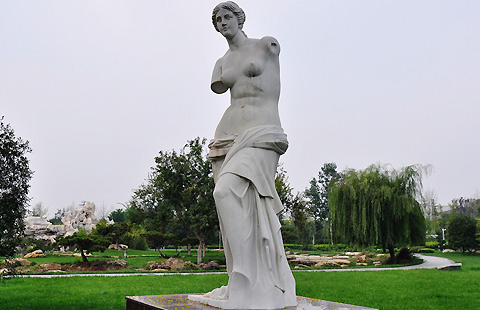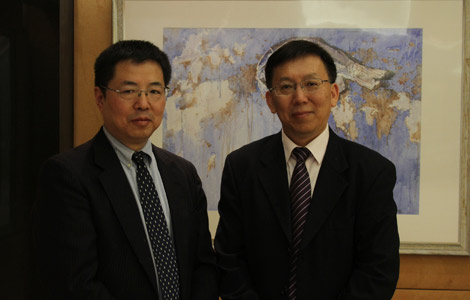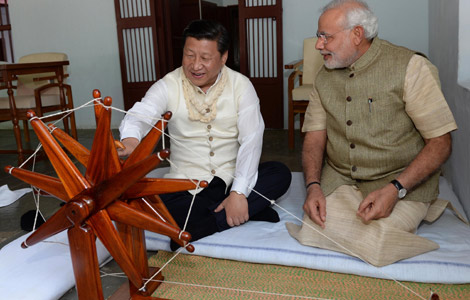China-Canada investment pact stirs controversy
Updated: 2014-09-20 06:49
By PAUL WELITZKIN in New York(China Daily Canada)
|
||||||||
Canadian Prime Minister Stephen Harper has ratified a foreign investment promotion and protection agreement between Canada and China(FIPA) in a move that one analyst said was designed to give Harper a goodwill gesture to present to the Chinese government ahead of the scheduled APEC meeting in November in Beijing.
The ratification announced on Sept 12 came more than two years after China and Canada reached the agreement in 2012. FIPA takes effect on Oct 1 and provides a legal framework to clarify rules on investment in both countries. It is designed to ensure that Chinese companies doing business in Canada and Canadian firms in China will be treated fairly and aims to create a more predictable and transparent business environment.
It took so long to ratify the treaty because of political heat the Harper government has taken on the issue. Critics said it was too favorable to China and would encourage China’s state-owned enterprises (SOEs) to buy Canadian companies.
"The timing of this is probably not a coincidence," said Wenran Jiang, a senior fellow at the Asia Pacific Foundation of Canada and a special adviser to the provincial government of Alberta. "Remember the Chinese ratified the agreement after it was unveiled in 2012. The Harper government has been sitting on this since then."
Jiang said by ratifying FIPA, Harper will have something to bring to the Chinese at the APEC summit in November.
Jiang said FIPA will not necessarily translate into an increase in Chinese investment in Canada. "The Chinese see this as a step toward a future free trade agreement with Canada," he said. The office of Canadian Minister of International Trade Ed Fast noted that FIPA "is not a free trade agreement".
What FIPA may do is encourage more Chinese investment in Canada’s booming oil-sands sector. "From 2009 until 2013 the Chinese invested over $35 billion in Canada’s energy sector alone. This is unprecedented," said Jiang. "China invests much more in Canada than Canada does in China,"
he added that Canadian investment in China in 2012 was $4.2 billion. "When US investment in Canada dried up after the world financial crisis in 2008, it was the Chinese who filled this gap."
According to Alberta Energy, the province’s oil-sands regulatory agency, Alberta’s oil sands are the third-largest proven crude-oil reserve in the world, behind Saudi Arabia and Venezuela. After the Nexen deal in 2013, the Harper government said foreign SOEs wouldn’t be able to invest in the oil sands projects, said Jiang.
"This is exactly what the treaty would address. Rules that are aimed at limiting or in some cases specifically eliminating Chinese investment," he said, noting that Chinese investment in the oil sands dropped dramatically after that.
Gus Van Harten, an associate professor of law at York University in Toronto, said FIPA may be a vehicle that secures more Chinese investment in the oil sands sector. "It’s possible that the Canadian government wants to get more investment in the oil sector and this action may end up encouraging that," he said.
Van Harten said FIPA is designed to give protection to investors from both China and Canada when they make an investment or business deal in the respective countries. "FIPA gives Chinese investors a general right of market access in Canada. However that is not reciprocal to Canadian investors," he said.
Van Harten also said the treaty has a carve-out clause when it comes to existing laws in each country that deal with intellectual property and other business regulations. "For example, there may be laws requiring special permits for certain businesses, or the use of different tax rates. All of those are left in place under this treaty."
The treaty will allow Chinese investors including SOEs to challenge Canadian laws that are considered harmful to their assets. Depending on the rule and assets in question, Van Harten said the dispute could end up in arbitration with a limited right to challenge the decision. He said arbitration means that certain individuals chosen by both sides can make a decision and depending on the result, public money may be paid to one party with little or no input from the federal government or the public.
"Some of these awards can be huge. One recent order involved $50 billion," he said.
Jiang said opponents of the treaty are over selling the potential negative implications from FIPA.
paulwelitzkin@chinadailyusa.com

 China wins gold in synchronized swimming duets at Games
China wins gold in synchronized swimming duets at Games
 Couples tie the knot in traditional group wedding
Couples tie the knot in traditional group wedding
 Shandong shelters replicas of famed sculptures
Shandong shelters replicas of famed sculptures
 Art exhibition unveiled at Chinese embassy in NY
Art exhibition unveiled at Chinese embassy in NY
 Benefit of teaming up goes beyond borders
Benefit of teaming up goes beyond borders
 Beijing center hosts art exhibition inspired by LA
Beijing center hosts art exhibition inspired by LA
 Young pianist joins an elite roster
Young pianist joins an elite roster
 WWII relics put on display
WWII relics put on display
Most Viewed
Editor's Picks

|

|

|

|

|

|
Today's Top News
Li seeks to fast track green cards in FTZ
Fence-jump intruder sparks White House alert
Chinese porcelain vase sets US auction record
Xi praises contributors to China-India friendship
Alibaba makes IPO history
Scottish voters have rejected independence
Tennis star Li Na sends farewell to fans
Alibaba jumps more than 40% in trading debut
US Weekly

|

|







